<Back to Index>
- Secretary of the National Fascist Party Giovanni Giuriati, 1876
- Secretary of the National Fascist Party Achille Starace, 1889
- Secretary of the National Fascist Party Ettore Muti 1902
PAGE SPONSOR
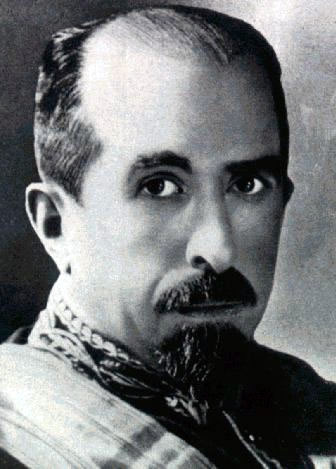
Giovanni Giuriati (4 August 1876 – 6 May 1970) was an Italian Fascist politician.
Giuriati was born in Venice.
A law graduate and lawyer, he associated in 1903 with the irredentist group Trento e Trieste ("Trento and Trieste" - regions which it aimed to have secede from Austria - Hungary), and soon became its president. In early 1915, he channeled aid from Italians in Austria for the earthquake hit town of Avezzano, and volunteered as a soldier in World War I. Wounded in the First Battle of the Isonzo, and again in the Third, he was twice decorated.
He returned to his legal practice as the war ended, but decided to follow the paramilitary movement of Gabriele D'Annunzio, as it attempted to seize the "unredeemed" and disputed port of Fiume (today Rijeka). Their forces were defeated in December 1920 by regular Italian troops, after they had ignored the provisions of the Treaty of Rapallo, and had even declared war on Italy. Nonetheless, Giuriati briefly served as provisional President of the territory after a coup d'état against the government Free State of Fiume in March 1922 (in 1924, the Kingdom of Yugoslavia would renounce claim to the city). In the meanwhile, he had joined the Partito Nazionale Fascista (PNF), being elected to the Italian Chamber of Deputies in 1921.
After the March on Rome, Giovanni Giuriati became Minister of Freed Territories in the Benito Mussolini government, and took over the Ministry of Public Works in 1925. He was President of the Chamber of Deputies between 1929 and 1934, and national secretary of the PNF in 1930. After 1934, he served as senator.
In 1943, he joined the condemnation of Italy's participation in the Axis, agreeing to the coup carried out by Dino Grandi inside the Grand Council of Fascism. The Italian Social Republic, a Fascist state recreated by Nazi Germany in Northern Italy, engineered the in absentia Verona trial against Grandi and his pro - Allies collaborators, during which Giuriati was sentenced to death. He escaped the wave of repression, and remained in liberated Italy. Charges of political corruption brought against him at the end of World War II were cleared, and Giuriati retired to a low profile life.
He died in Rome in 1970.
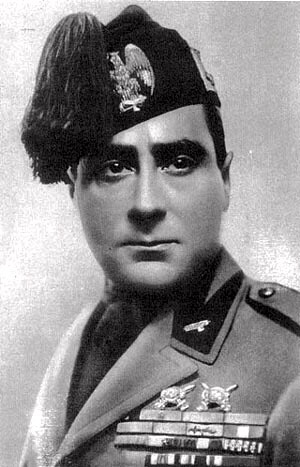
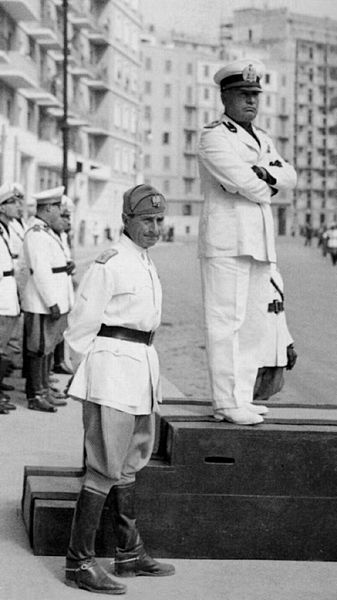
Achille Starace (August 18, 1889 - April 29, 1945) was a prominent leader of Fascist Italy prior to and during World War II.
Starace was born in Gallipoli in southern Italy near Lecce. He was son of a wine and oil merchant.
Achille Starace attended the Lecce Technical Institute as a young man and earned a degree in accounting. In 1909, he joined the Italian Royal Army (Regio Esercito ) and by 1912 had become a Second Lieutenant (Sottotenente) of Bersaglieri.
Seeing action during World War I, Starace was highly decorated for his service, winning a Silver Medal of Military Valor. After the war, he left the army and moved to Trento, where he first came into contact with the growing Fascist movement.
An ardent nationalist,
Starace joined the Fascist movement in Trento in 1920 and quickly
became its political secretary. In 1921, his efforts caught the
attention of Benito Mussolini, who put Starace in charge of the Fascist organization in Venezia Tridentina. In October 1921, Starace became Vice - Secretary of the National Fascist Party (Partito Nazionale Fascista, or PNF). In 1922, Starace participated in the March on Rome (Marcia su Roma), leading a squadron (squadristi) of Blackshirts (Camicie Nere, or CCNN, or Squadristi) in support of Mussolini.
Later in 1922, Starace was appointed Party Inspector of Sicily and was made a member of the Executive Committee of the PNF. In 1923, after resigning as Vice - Secretary of the party, he was made commander of the National Security Volunteer Militia (Milizia Volontaria per la Sicurezza Nazionale or MVSN) in Trieste. The MVSN was an all volunteer militia created to organize former Blackshirts.
In 1924, Starace was elected to the Italian Chamber of Deputies and
made National Party Inspector. In 1926, Achille Starace once again
became Vice - Secretary of the PNF, and, in 1928, he was appointed
Secretary of the Milan branch of the party.
In 1931, his career reached its peak when he was made Party Secretary of the PNF. He was appointed to the position primarily due to his unquestioning, fanatical loyalty to Mussolini. As secretary, Starace staged massive parades and marches, proposed Anti - Semitic racial segregation measures, and greatly expanded Mussolini's cult of personality.
Although
Starace was successful in increasing party membership, he failed in the
later years of his tenure as Secretary to reorganize the Italian
Fascist Youth Organization (Opera Nazionale Balilla) along the lines of the Hitler Youth (Hitler - Jugend). He also failed to inspire a nationwide enthusiasm for Fascism on par with the popularity the Nazi Party enjoyed in Germany.
Starace served as secretary for a total of eight years. This was longer
than any other Secretary had served. But, by the mid 1930s, he had
gained numerous enemies in the party hierarchy.
In 1935, Starace, a Colonel, took a leave of absence as PNF Party Secretary to participate in the Italian invasion of Ethiopia and fought on the northern front. In March 1936, after the Battle of Shire, he was given command of a mixed group of Blackshirts and Bersaglieri being assembled in Asmara, Eritrea. Later that month, Starace and his truck transportable "mechanized column" prepared to advance over rough tracks to seize Gondar, the capital of Begemder Province. Prior to setting out, "the Panther Man" (L'uomo pantera) gave the following speech to his men:
Soldiers, this is the most risky, most difficult and most important venture of the campaign. Don't waste a shot. We are carrying all the ammunition we are going to have on this trip. This column must be like an electric live wire. Death to the touch! Truck drivers must learn to keep to the right of the road under pain of severe penalties...
Britain is a rich country, Italy is a poor country, but the people of poor countries have hard muscles. The only way to explain the action of the English is that they thought they had only to mass a war fleet in the Mediterranean and Premier Mussolini would take off his hat and bow in submission.
Instead he reared up like a thorough bred horse and sent his soldiers into Africa. Viva Il Duce!
The
road building skills of Starace's men played an equally important role
to their combat prowess. The following morning, April 1, Starace and the
column entered Gondar in triumph and two days later reached Lake Tana, securing the border region with British Sudan. The East African Fast Column (Colonna Celere de Africa Orientale) had covered approximately 120 km in three days.
After Ethiopia, Starace resumed his duties as Party Secretary. He continued to be controversial. For example, he decreed that all party flags must be made from an Italian manufactured textile fabric called "Lanital." Lanital was invented in 1935 and, according to Starace, it was "this product of Italian ingenuity." The basis of Lanital is casein. Casein is the thick substance in sour, skimmed milk from which cottage cheese is made. In 1936, Dino Grandi, the Italian Ambassador to Great Britain, appeared in London wearing a suit said to have been made from forty - eight pints of skimmed milk.
During the Munich Crisis in 1938, Starace was a vocal proponent of the French agreeing to turn over Tunisia to Italy.
In October 1939, Starace was finally dismissed as Party Secretary in favor of the popular Ettore Muti. He was made Chief of Staff of the MVSN and he held this position until being dismissed for incompetence in May 1941. He was succeeded by Enzo Galbiati.
In 1943, following the demise of Mussolini's regime, Starace was arrested by Pietro Badoglio's Royalist government. He was arrested despite the fact that his real power under Mussolini had ended two years earlier.
After unsuccessfully attempting to regain Mussolini's favor in the German backed Italian Social Republic of Salò, Starace was again arrested. This time he was imprisoned in a concentration camp in Verona and was arrested by his former colleagues on charges that he had weakened the party during his tenure as Party Secretary.
Starace was eventually released and moved to Milan. On 29 April 1945, during his morning jog, he was recognized and captured by anti - Fascist Italian partisans. After a summary trial, he was sentenced to death.
Starace was taken to the Piazzale Loreto and
shown the body of Mussolini, which he saluted just before he was shot.
His body was subsequently strung up next to Mussolini's.
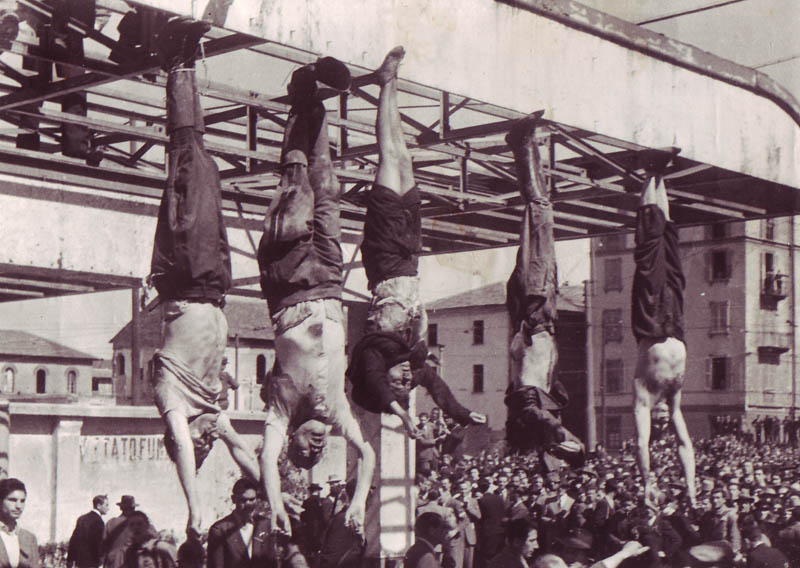
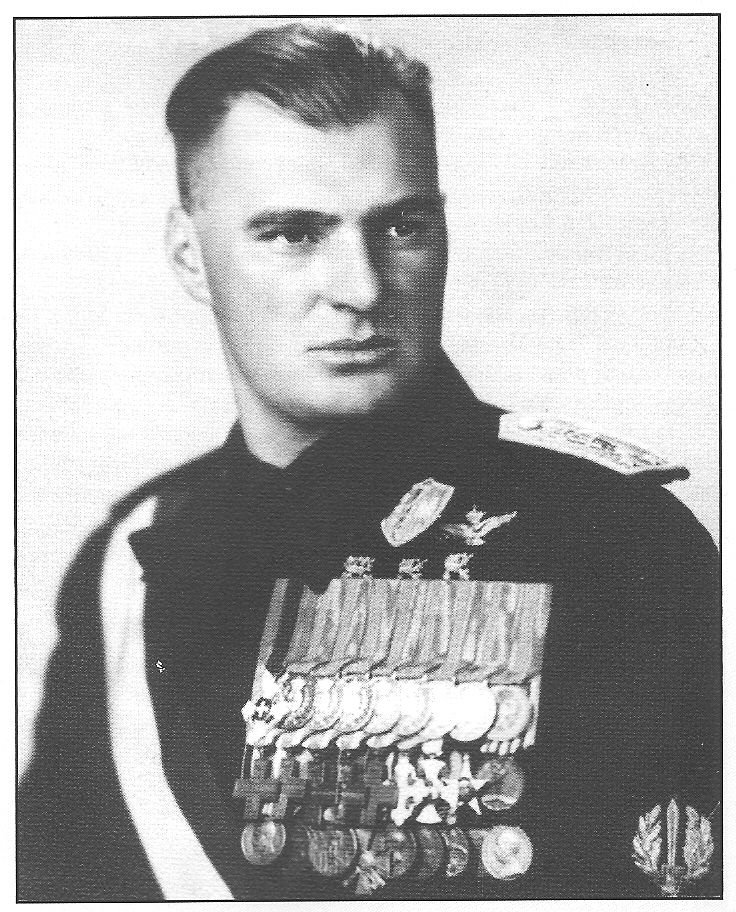
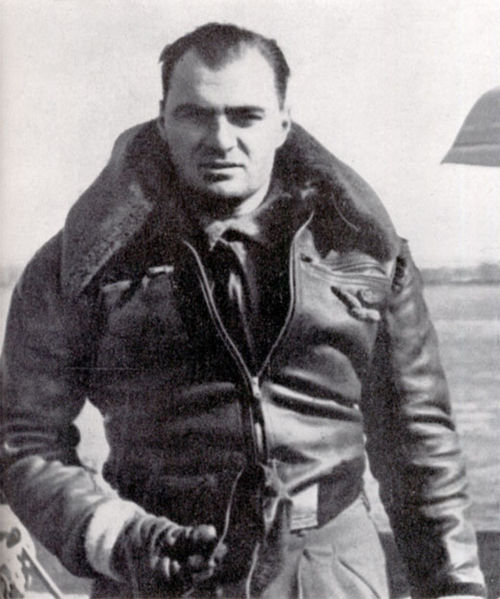
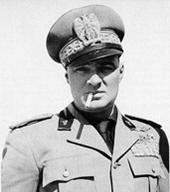
Ettore Muti (May 2, 1902 - August 24, 1943) was an Italian aviator and Fascist politician. He was Party Secretary of the National Fascist Party (Partito Nazionale Fascista, or PNF) from October 1939 until shortly after the entry of Italy into World War II on June 10, 1940.
Born in Ravenna, Romagna, Muti was banned from any school in the country at age 13, after punching one of his teachers. The next year, he ran away from home in order to fight in World War I, but was recovered and returned by the Carabinieri. At 15, a new attempt was successful, and Muti joined the famed Arditi.
On the front, Muti distinguished himself through feats of audacity. His detachment of
800 men was ordered to establish a bridgehead under enemy fire: it
managed to do so, but was only left with 23 members at the end of the
day. Gabriele D'Annunzio benefited from Muti's services during his seizing of Fiume in September 1919 - January 1921; he gave Muti the lasting moniker Gim dagli occhi verdi ("Green - Eyed
Jim"). In fact, Muti was rarely involved in fighting over Fiume, being
more likely to engage in flamboyant stunts. On this, D'Annunzio has told
Muti: "You are the expression of Superhuman values, an impetus without weight, an offer without measure, a fistful of incense over ember, the scent of a pure soul".
During this time, Muti met Benito Mussolini, for whom he developed a lasting fascination. A Fascist as soon as the Fiume episode came to an end, he was arrested on several occasions. On October 29, 1922, he was head of the squad that occupied Ravenna City Hall during the March on Rome. After the taking over of the state, Ettore Muti made a career in the Blackshirts, organized as the "Voluntary State Security Militia" (Milizia Volontaria per la Sicurezza Nazionale, MVSN).
His life remained adventurous: a womanizer and entertaining host, Muti cruised in speeding cars or on his Harley Davidson. In 1926 he married the daughter of a banker, and, in 1929, fathered his only child Diana. He escaped an assassination attempt carried out by a left wing activist on September 13 1927, but was shot twice in his abdomen and arm. His survival was uncertain for long, and he was left with a 20 cm scar.
He joined the Regia Aeronautica (Italian air force), developing a passion for aircraft - he accepted to be demoted to lieutenant, according to the practical requirements of the service. He flew during the Second Italo - Abyssinian War in 1935 - 1936, where his skills as a pilot earned him a silver medal.
In 1936 he returned to Italy, but left soon after as a volunteer on Francisco Franco's side in the Spanish Civil War, fighting under the pseudonym Gim Valeri. He led a squadron of bombers over Republican ports, winning several silver medals, and, in 1938, a gold one. He returned with the new moniker Cid alato ("The Winged El Cid") and the prestigious Military Order of Savoy. Later in 1938, he left for Italian influenced Albania, staying on through its full occupation by Italians in 1939 (and winning yet another medal).
Upon his return, Muti was awarded the PNF Party Secretary position replacing Achille Starace. He was awarded this position based on the intervention of his friend Galeazzo Ciano. However, Muti disliked this inactive duty, and profited from the outbreak of the war to return in the military. As a Lieutenant Colonel, Muti participated during the Italian invasion of France, during the long range bombing of Haifa and Bahrein, and during the Battle of Britain. However, his hasty departure from his Party Secretary position made him lose the friendship of both Ciano and Mussolini.
In 1943, Muti joined the military intelligence service. On July 25, the day of the pro - Allied coup d'état in the Grand Council of Fascism, Muti was in Spain, trying to obtain the radar of a United States aircraft that had crashed on neutral territory. He returned to Rome on July 27, and remained in his private villa. On the night of August 23 - 24, a group of Carabinieri entered his residence and placed him under arrest. They all left through a pine forest surrounding the area, and the following moments are still mysterious. The official communiqué stated:
Following an investigation into major irregularities in the administration of a state - associated entity, during which the implication of the ex - secretary of the dissolved fascist party, Ettore Muti, has become apparent, the Carabinieri military corps proceeded in Muti's arrest at Fregene, near Fiumicino (then part of the comune of Rome), on the night of August 23 - 24. As they led him to their barracks, the escort was shot at with several rounds from the forest. In the momentary disturbance, he attempted to run away, but, after being shot at and wounded by the Carabinieri, he died.
The major irregularities mentioned were never clarified, nor were the identities of shooters in the forest. In the dramatic gunfight, Muti was the only one hit: his cap displayed two holes, one in the back of the head, the other in front. Other circumstances point as well towards a political execution, with Ettore Muti as the first victim in the violence that engulfed Italy for the next two years. Pietro Badoglio, the leader who had deposed Mussolini, defined Muti as "a menace" in a letter he had previously sent to the head of the local police: it is likely that Muti was informed about the role of Badoglio in the catastrophic Italian defeat of Caporetto, a role that Badoglio in the years after World War I had tried to hide.
After his death, Muti became the main hero of Italian fascist regime (revived in northern Italy with help from Nazi Germany, as the Italian Social Republic). His name was given to an autonomous Police Legion stationed in Milan and to one of the most feared Black Brigades units.